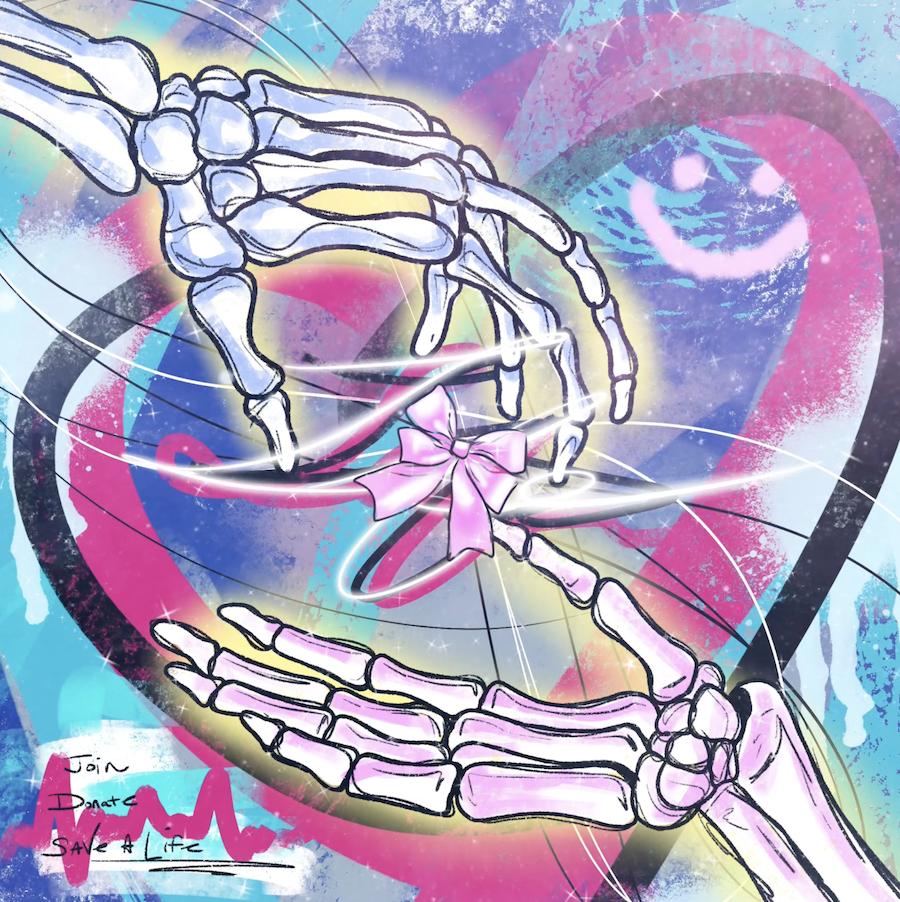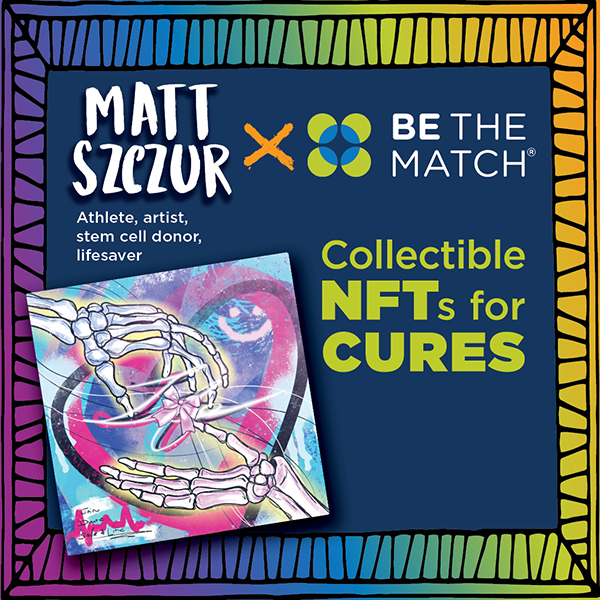A baseball world champion uses NFTs to save lives
When world champion Matt Szczur joined a bone marrow registry in 2007 as a college freshman, he didn’t think much of it. At the time, Szczur (pronounced “Caesar”) was playing football for Villanova University. His coach, the legendary Andy Talley, encouraged him to get involved with an organization called Be The Match. As the name suggests, the group matches bone marrow donors with recipients and raises money to help those suffering from life-threatening blood cancers, such as leukemia and lymphoma, provide needed treatment.
“I thought I’d test [to be a match], and if I get a call, great,” Szczur said in an interview with nft now. “If not, it is what it is.”
15 years ago, the chances of matching a donor with a recipient were not what they are today. Bone marrow and umbilical cord blood unit donor-recipient matching is dependent on matching human leukocyte antigen (HLA) types, which a patient’s ethnic background plays a prominent role in predicting. The more people in the register, the greater the chance of finding matches for people in need.
Szczur put it out of his mind until the fall of 2009 when he got a call from the Be The Match registry telling him they had found a recipient for his bone marrow type. “It was in the middle of the playoffs,” Szczur continued. “I went and talked to Talley and he put his head down and said, ‘Matt, I know you’re going to do the right thing.'”
That battle was a young girl named Anastasia Volkovskaya from Ukraine, whose doctors diagnosed her with leukemia just three months after she was born. “The doctors told us she needs a transplant,” Volkovskaya’s father Ivan explained in one ESPN video about Szczur’s journey to becoming a donor produced for the broadcast series from the sports magazine E:60. “But in Ukraine they don’t do this. They said, ‘Take it.’
Volkovskaya’s parents continued to look for ways to save their daughter, and eventually found a clinic in Israel that could provide the transplant – if they could find a matching donor. They found one in Szczur who was a 100 percent match. On May 4, 2010, Szczur donated his bone marrow in a peripheral blood stem cell (PBSC) procedure, a non-surgical operation in which doctors separate a patient’s blood-forming cells from the rest of the blood for bone marrow transplants.
It would be some time before Szczur learned exactly who he had donated to. Confidentiality practices prevent donors from learning the identity of the recipients they match with for at least one year after the procedure. It touched him deeply when he finally learned Anatasia’s identity and came into contact with her and her family.
“I remember like it was yesterday when I got the email from Be The Match about who she was and where she’s from,” Szczur said. “When I was finally able to connect with her – it was very emotional. I now have a three-year-old son. I understood the importance of [donating] then, but now, you know, I would do anything in the world to help my son, and I’m sure it is [ Volkovskaya’s parents] felt.”
Volkovskaya’s parents’ gratitude for what Szczur did knows no bounds. “This man gave life not only to one child, he gave life to a whole family,” said Anatasia’s mother Marina i ESPNhis E:60 video.
Using NFTs to raise awareness and save lives
Throughout his life, Szczur has dabbled in art in one way or another. Whether he sat next to his father as a child and watched him make colorful bucktails (fishermen’s decoys traditionally made from deer hair) or experimented with paint as a way to decompress from the stress of being an athlete, it’s a part of life that he never liked to stray far.
After playing for Major League Baseball and winning the World Series with the Chicago Cubs in 2016, Szczur and his wife Natalie started a non-profit foundation dedicated to philanthropy and charity. To raise awareness for the foundation, Szczur decided to paint two self-portraits and auction them off at an event the couple held in his hometown of Cape May, New Jersey. Both were sold for $500. Cubs’ management later reached out to commission Szczur to create a painting of the team’s World Series victory, which the organization sold for $40,000.
Szczur’s interest and involvement in NFTs would follow soon after. During the 2020 pandemic, fellow MLB player Micah Johnson reached out to Szczur to ask if he wanted to collaborate on an NFT project. “I had read about the blockchain, but I had no idea what it was,” Szczur said. “I knew a little bit about Bitcoin, but I had never heard of Ethereum. I trusted Micah because he was a baseball player, and I knew he was a grinder. I respected him.”
“It doesn’t get more real than someone who actually donated and saved the life of another human being.”
Alex Mensing, BE THE SPEAKER OF THE FIGHT
Johnson suggested creating a portrait of George Floyd, and the two split the portrait in half, each depicting a side of Floyd in their own style. The limited edition sold out on Nifty Gateway in under six minutes, and the two used the funds raised from the painting to donate to initiatives dedicated to fighting injustice in the black community.
Szczur has continued to expand into the world of crypto art, creating pieces for collectors to purchase on OpenSea, Nifty Gateway and SuperRare. His artwork often features bones and skeletons, reflecting the awareness he is trying to raise about bone marrow donation.
Be The Match NFT Auction
Having long wanted to work with Be The Match, Szczur found a golden opportunity to do so when a friend who had contacts in the bone marrow registry asked if he wanted to work with the organization earlier this year.
Szczur and Be The Match are releasing two separate NFTs on the Nifty Gateway in the coming days and weeks to raise awareness and money for the registry. The first is an open edition called Be The Match which comes out on Friday 26th. August and will be available for sale for 48 hours. Editions start at $150 each. A second, limited edition NFT drop will also be available through a 48-hour auction on Thursday, September 8, which Szczur says will be a different version of his previous skeleton and bone NFT creations.

Half of all proceeds from NFT sales will go to the Be The Match Foundation to help patients looking for a donor and add more potential donors to their registry.
“This is Be The Match’s first experience in the NFT space,” explained Alex Mensing, a Be The Match spokesperson in an interview with nft now. “Partnering with Matt was a no-brainer. He’s already spread awareness about bone marrow donation through his NFTs, it’s something he’s passionate about. It doesn’t get more real than someone actually donating and saving another human’s life. It’s our mission.”
One of the reasons both Mensing and Szczur are excited to use NFTs as a way to spread awareness about the registry is because HLA types largely determine who can and cannot match. The more diverse the registry, the greater the chances of these matches actually occurring.
“I can honestly say that NFTs changed my life.”
MLB World Champion Matt Szczur
“Right now you see a difference in the registry based on the ethnic diversity of the patient applying,” Mensing elaborated. “So today a patient who is white or Caucasian has a 79 percent chance of finding a match in our registry. But a black or African-American patient only has a 29 percent chance of finding a match. And so we do a lot of recruiting to get more people to join the registry. And we have the most diverse registry in the world. It’s still not diverse enough to meet all the patient needs that exist.”
Szczur’s enthusiasm for and dedication to the cause he has devoted the last decade to is admirable. Despite the maligned reputation people often attach to NFTs and cryptocurrencies, he is adamant about their ability to do good in the world.

“I can honestly say that NFTs changed my life,” Szczur said. “From top to bottom. I had no idea what I was going to do when I finished [playing] baseball. So the transition from baseball to real life was helped so much by NFTs. I know people are skeptical about it, and they have a right to be. Cryptocurrency is so volatile. But they changed my life. I am grateful for the space.”
The former MLB world champion is even more grateful for the opportunity to use technology to spread awareness about a cause he believes in deeply. His experience as a Be The Match donor is something he says will stay with him for life.
“They literally save lives,” Szczur stressed. “Everyone says there is no cure for cancer, but here we are doing this, and no one really hears about it. So I continue to push for this cure and for bone marrow awareness. I will continue to push this because I saw the impact it had on my life and the impact it had on this family’s life.”
Those who wish to support the foundation’s efforts and help save lives can add their names to Be The Match’s bone marrow register here.


